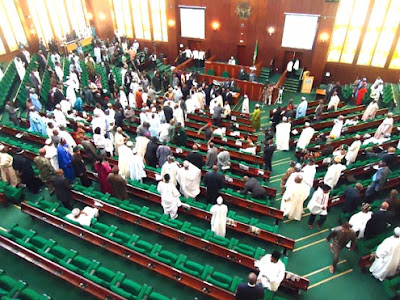Seventy-one members of the House of Representatives have begun moves to return Nigeria to a parliamentary system of government, Punch is reporting.
The bill aimed at amending the 1999 Constitution was presented on Thursday to the House.
Leading the address, Nicholas Ossai(Chairman, House Committee on Public Petition), who introduced himself as the secretary of the group leading the movement, with Kingsley Chinda as chairman, said:
“The economies of nations are known to thrive on the confidence of investors in the system and character of government. The level of instability and volatility of the presidential system makes it difficult to achieve economic objectives.”
Ossai told reporters after the plenary that:
The overcentralisation of government decisions that are prevalent in the presidential system obstructs economic development when compared to the parliamentary or hybrid system.
The point has also been made that the too powerful nature of the presidential system often leads to greater fluctuations in the economy with a change of office. This was witnessed in Nigeria in 2015 and is currently being experienced as we prepare for the 2019 elections.
Seventy-one of us sponsored that bill. Our position in this legislation clearly points to compelling advantages of a parliamentary system of government to economic growth and development, as well as its inherent efficiency in the conduct of government business.
Studies have shown empirically that countries run by presidential system consistently produce lower output growth, higher and more volatile inflation and greater income inequality relative to those under parliamentary ones. Little wonder the rich continue to be richer whilst the poor get poorer, and we have become the poverty capital of the world.
There are countless empirical records which show that output growth under presidential systems are in zero points (negative) while output growth under parliamentary systems clocks from one point and above (positive). Great Britain is an example. France is another example. Australia is also an example of countries with high positive output.
Even when Nigeria was practising it in 1960, if you see the output and the growth in terms of employment rate that Nigeria witnessed, you will marvel but the military took over and gave us the presidential system of government in 1979, and that system has not increased any economic benefit for our country.
In 1983, the military struck again, and came back in 1999 to impose a constitution with presidential system of government that has been complex; a system that the bureaucracies are in two key areas. There is the Presidency. Under the Presidency you will see a lot of agencies within the bureaucratic setting, different from the civil service bureaucracy. You could see that the result of this is a high cost in governance.
Due to the excessive powers domiciled in one man under the presidential system, consensus building that is often required for economic decision is always lacking. If it is under a parliamentary system, the prime minister is part of the legislature.
The over-centralisation of government decisions that is prevalent in a presidential system obstructs economic development when compared to the parliamentary or hybrid system.
The point has also been made that the too powerful nature of the presidential office, often leads to greater fluctuations in the economy with the change of office. This was witnessed in Nigeria in 2015 and currently being experienced as we prepare for the 2019 general elections. Such volatility is evidenced by sharper electoral cycles under presidential systems than that of parliamentary systems.
The decentralisation of powers in parliamentary system helps to douse tensions in countries – like Nigeria – where ethnicity, race, religious differences and ideological divisions are prevalent, thereby promoting peace and unity which are ingredients for economic growth and development.
Parliamentary systems promote inclusion and collectiveness which is critical to equality of income distribution and opportunities.

